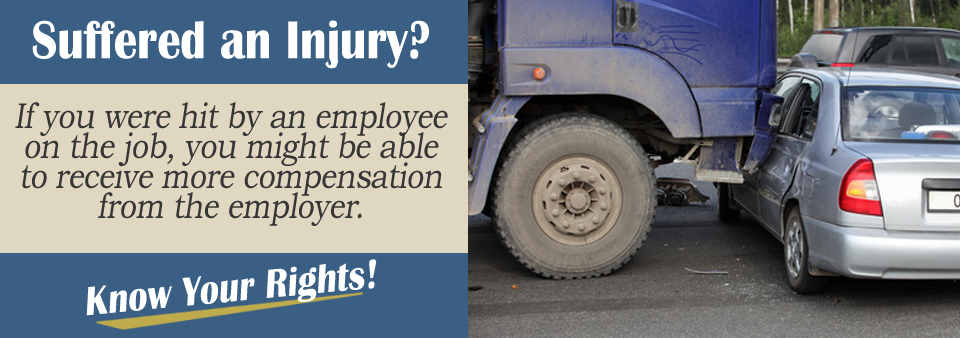If you have been injured in a car accident involving a semi-truck, you may not know who to sue for damages or injuries sustained in the accident. While many companies hire independent contractors to work as truck drivers, if they are driving for a specific person or company, you could seek damages from that person or entity as well.
You have several options available to you based on this typical, albeit complicated, situation. We have asked attorney, Alaina Sullivan, about what you should do. Here is what she had to say:
Who Do You Sue?
Things are a little more cut and dry when it comes to a normal car accident. You sue the driver of the car who hit you. In some states, you sue the owner of the car rather than the driver, but in most situations, it is the former rather than the latter. However, when it comes to some driving a commercial truck, suddenly things get much more complicated.
You actually have several different options for people or entities you can sue. The first choice is obvious. You can sue the truck driver personally. However, if the truck driver is directly employed by another company and is not an independent contractor, you can sue the employer. The truck driver is acting in his capacity as an employee of “X” Corporation.
Therefore, his employer would be liable for any act of negligence done by him in the course of his employment. If he is driving the truck to complete a job for his employer, and he causes an accident during that time, the employer can very well be liable.
Trucking accidents are among the worst accidents that can happen. Because of the size of a truck, accidents can be catastrophic. One the first questions people ask after a truck accident is who should they sue? The truck company may try to avoid all responsibility. if the trucker carries the company’s name anywhere on or in its vehicle, such as on its operating placard, the trucking company bears a degree of responsibility for the driver’s actions.
Some examples of trucking company negligence include negligent hiring which involves hiring drivers that have a history if driving violations. Another reason why the company could be held liable is of the company didn’t perform adequate drug testing. Although a truck driver may be liable for an accident the company could share fault for negligent hiring or negligent retention.
What Damages Am I Entitled To?
If your car was hit by a semi truck, you could be entitled to both compensatory and punitive damages from the driver and the entity, i.e the trucking company itself.
Compensatory damages are monetary payments made to a plaintiff that help recover money that was used for medical bills, pain and suffering and money lost from time off from work.
If you wish to pursue punitive against the driver or entity of the semi truck, you could be awarded payments that are intended to punish them. If you were hit by a semi truck, a personal injury lawyer will be able to advise you on what damages you should file a claim for.
Since being hit by a semi truck isn't usually a black and white case, your lawyer will be also be able to counsel you on which parties to file a lawsuit against.

Know the Parties Involved in the Claim
Situations vary. If the company has hired someone who owns a truck who then hires someone to drive his truck, you have several different layers of people you can sue. You could even sue the person whose products were being carried in the truck.
It all depends on the circumstances and how the accident occurred. Why did the accident happen? Did the truck driver fall asleep at the wheel? Was there a mechanical failure with the truck?
Suing the Company Only
You want compensation for your injuries, plain and simple. Are you going to get that from the individual truck driver or the company who has employed him?
Sure, you might want to go after the actual individual physically responsible for hitting your vehicle, but that person likely has no more money than you do. If you have any hope of receiving monetary compensation, odds are, you will be better off seeking relief from the employer.
Independent Contractors
Many truck drivers technically work for themselves. Companies will hire out these independent contractors to drive their merchandise or product across the country. If you have been injured by the actions of an independent contractor, you would sue the trucker.
However, you should also examine whether that contractor is also the truck’s owner. If someone else owns the truck and the driver is merely driving it, you also have the option of going after the owner of the truck.
Normally the company that hires an independent contractor would not be responsible for that person’s negligence, but it can depend on what the agreement included when they hired that person.
A good agreement will have a clause saying that the company is not responsible for the independent driver’s negligence. Keep in mind that if the company has any control whatsoever on the actions of the driver, and that is in the contract, a loophole might open allowing you to sue the company as well. This type of situation is pretty rare.
Trucking Laws and Regulations
It is important you talk with an attorney who is well-versed in trucking laws and regulations. The trucking industry is governed by federal trucking regulations, and these are not your run-of-the-mill car accident violations. Make sure the lawyer you hire is aware of these regulations and knows when they do apply.
Contact an Attorney Today
A licensed personal injury attorney will be able to evaluate your case and determine if you have a claim against the other party’s insurance company. You should speak with a personal injury attorney in your area today for the best chance of receiving the compensation you need to pay for:
- Medical bills
- Auto body bills
- Pain and suffering
